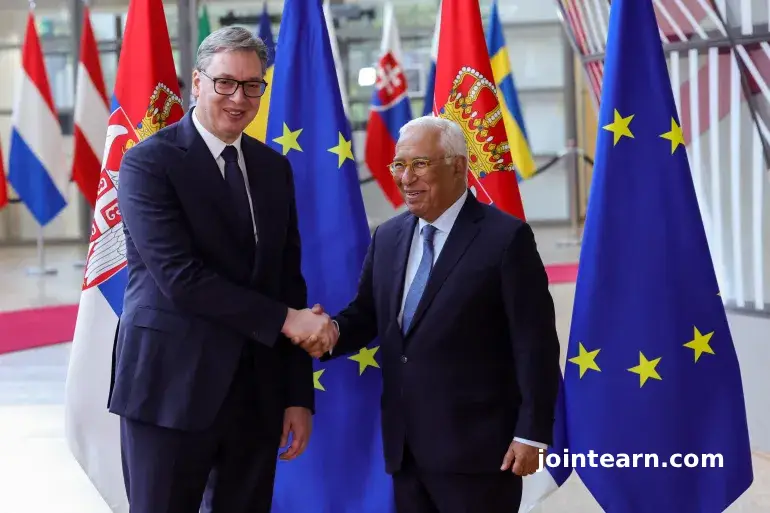
Serbia has come under pressure from Russia after President Aleksandar Vucic publicly discussed the potential sale of the country’s ammunition stockpiles to the European Union, raising concerns that the weapons could indirectly end up in Ukraine amid the ongoing war with Moscow.
Vucic Signals Willingness to Sell Ammunition
In a televised interview with Euronews, Vucic confirmed Serbia’s readiness to sell large quantities of ammunition to European countries, including mortar shells, even if some ended up in a war zone.
“We need to sell it to someone, and we’ll sell it to whomever we can in order to earn some money, but we’ll try to take care and not see that ammunition end up in a war zone. But it happens from time to time,” Vucic said.
“At the end [of the day], we’ll have to pay our workers. Tell me, is there something that is not rational?”
He also told Germany’s Cicero magazine that he had offered EU “friends” the opportunity to purchase Serbian ammunition, adding that buyers could ultimately do what they want with the stockpiles, a statement seen as indirectly referencing Ukraine.
Russia Demands Clarification
Russia reacted swiftly, with Ministry of Foreign Affairs spokeswoman Maria Zakharova demanding an explanation for Vucic’s remarks. Serbia has repeatedly assured Moscow that its ammunition would not reach Ukrainian forces, making Vucic’s comments a source of tension between the traditionally allied countries.
Earlier in May, Moscow accused Serbia of supplying ammunition indirectly to Ukraine via third-party contracts, marking a rare diplomatic rebuke of a long-standing ally.
Serbia’s EU Ambitions in the Spotlight
Vucic’s comments come amid Serbia’s ongoing EU accession process, which began in 2009. Last week, the European Commission released its annual progress report, highlighting concerns over high levels of political polarization, anti-EU narratives promoted by media and political offices, and slow progress toward reforms.
European Commission President Ursula von der Leyen recently urged Serbia to “get concrete” about its accession ambitions, stressing the broader geopolitical divide between democracies and autocracies.
Serbia remains the only European country not to impose sanctions on Russia over the Ukraine conflict, making its position a point of tension within the bloc.
Domestic Unrest and Public Frustration
Serbia has also faced widespread domestic unrest. The first anniversary of the deadly Novi Sad railway station collapse, which killed 16 people, drew around 100,000 protesters, highlighting public frustration over corruption and government mismanagement.
Counter-protests organized by Vucic’s Serbian Progressive Party have further polarized the political environment, with supporters arriving from outside Belgrade to demonstrate in favor of the government.
Balancing Moscow and Brussels
Vucic has sought to balance Serbia’s historical ties with Russia and its European aspirations, attending Moscow’s World War II commemorations earlier this year while also engaging EU leaders over accession talks.
His recent statements signal a willingness to cooperate with the EU commercially, even as political allegiances with Russia remain delicate. Analysts note that Serbia’s position highlights the complex geopolitics of Balkan nations, which must navigate pressures from both Western institutions and Russian influence.
Key Takeaways
- Serbian President Aleksandar Vucic discussed selling ammunition to the EU, sparking Russian concerns.
- Russia demands clarification, citing prior assurances that Serbian ammo would not reach Ukraine.
- Vucic offered EU “friends” the chance to purchase mortar shells from Serbia.
- Serbia continues to pursue EU membership, with the Commission urging more concrete progress.
- Domestic protests over corruption and safety issues reflect growing public frustration.
- Serbia remains the only European country not sanctioning Russia amid the Ukraine conflict.


Leave a Reply